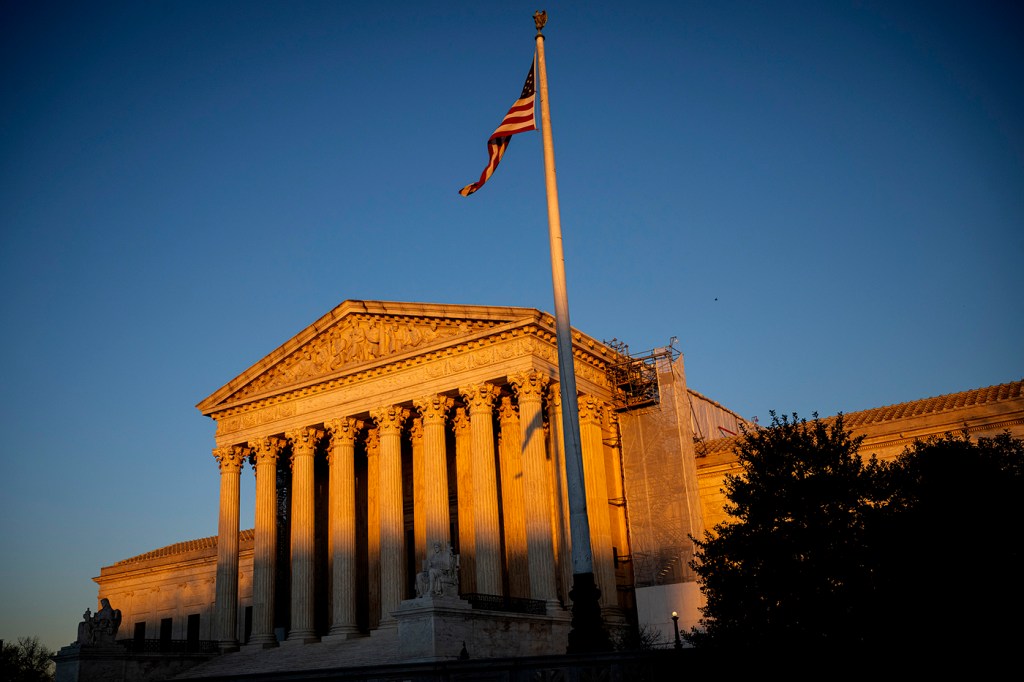‘There is a point of controversy’: Legal experts dissect Supreme Court’s unanimous ruling on Trump’s eligibility
Northeastern legal experts say the decision puts to rest the question of whether states can outright disqualify candidates suspected of violating the 14th Amendment of the Constitution.

In a rare moment of agreement, the U.S. Supreme Court spoke in unison on Monday, declaring that former President Donald Trump should remain on Colorado’s primary ballot after the state barred him from running for office.
The 9-0 decision said that Trump could remain on the Colorado ballot, but four justices — Amy Coney Barrett, Elena Kagan, Sonia Sotomayor and Ketanji Brown Jackson — stated in concurring opinions that the majority overstepped in declaring Congress the ultimate arbiter in matters pertaining to the so-called “insurrection clause” of the 14th Amendment.
“Because the Constitution makes Congress, rather than the States, responsible for enforcing Section 3 against federal officeholders and candidates, we reverse,” the high court said.
“There is a point of controversy,” says Martha F. Davis, university distinguished professor of law. “What they had to decide was whether Trump could be on the Colorado ballot, and whether individual states could exclude insurrectionists from their ballots. But they didn’t have to take the next step and decide whether Congress is the exclusive mechanism for enforcing that.”
But the decision puts to rest the question of whether states can outright disqualify candidates suspected of violating the little-known provision.
Featured Posts
“It’s clear that states cannot do that,” Davis says. “And there’s an understandable argument. As a practical matter: were they able to, it would mean that a single state can undermine the candidacy of an insurrectionist.”
She continued: “But the 14th Amendment was also intended to take power away from states, and so this is an interpretation of the 14th Amendment that is consistent with the impetus of what the 14th Amendment was: namely, to strip states of power.”
But it’s not at all clear, Davis says, that Congress should be the sole authority enforcing the provision. Some legal scholars have argued that the insurrection clause of the 14th Amendment is “self-executing,” meaning that anyone who meets the criteria set forth in it is automatically disqualified, and that a finding saying as much from another legal body or authority — Congress, for example — is not required.
In a decision that shook the legal world, the Colorado Supreme Court in December ruled that Trump was ineligible to appear on the state’s primary ballot because he engaged in insurrection, citing Section 3 of the 14th Amendment.
Section 3 of the 14th Amendment reads: “No person shall … hold any office, civil or military, under the United States … who, having previously taken an oath … as an officer of the United States … to support the Constitution of the United States, shall have engaged in insurrection or rebellion against the same, or given aid or comfort to the enemies thereof.”
“Even though ‘[all] nine Members of the Court’ agree that this independent and sufficient rationale resolves this case, five Justices go on,” Kagan, Sotomayer and Jackson write. “They decide novel constitutional questions to insulate this Court and petitioner from future controversy.”
The case began in September, when six Colorado voters brought a case seeking to disqualify Trump from the state’s primary ballot, alleging that Trump’s inflammatory comments in the lead-up to the Jan. 6, 2021, attacks aided an insurrection. (The Supreme Court declined to say whether the attacks constituted an insurrection.)
Monday’s ruling shocked very few legal experts.
“In the oral argument, it was clear that Justice Kagan was very troubled by the idea of different states reaching different opinions … she used the word patchwork — and that word appears in the opinion itself,” says Jeremy R. Paul, a professor of law and former dean of the Northeastern University School of Law.
Still, many disagree with the scope of the decision.
“I don’t think it’s particularly well-grounded, because the language of the Constitution points the other way,” Paul says. “I would have much preferred a narrower ruling.”
Paul — like Davis — notes that he thinks the majority overstepped.
“Five justices said the only way a candidate could be removed from a ballot is if Congress passes a statute,” he says. “There’s no reason the court should ever go out of its way to decide on something that’s beyond the scope of the case.”
Following the ruling, Trump, who still faces 91 federal indictments from four criminal probes, praised the court, noting “it was a very important decision.”
“I think it will go a long way toward bringing our country together, which our country needs,” Trump said.











